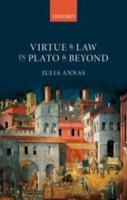
OUP (2017) h/b 234pp £35 (ISBN 9780198755746)
Plato’s final dialogue, the massive and rambling Laws, has long languished in comparison with his other works, which are shorter and more readable. Wilamowitz in 1920 recommended philosophers to spare themselves the labour, and this advice appears to have been followed. But interest has grown in recent years. The fact that someone of A.’s eminence has now devoted a book-length study to it marks a significant step in its rehabilitation.
In Plato’s Republic, the aim was to make all the citizens happy by placing them under the rule of philosopher-kings whose long training in dialectic qualified them to decide what was best for everybody. Citizens would then achieve happiness by developing the virtues appropriate to them. The rulers of Magnesia, the ideal city described in the Laws, are, in contrast, simply there to enforce a law code covering all aspects of life. If you are a Magnesian you will have to obey this law code to the letter if you wish to achieve virtue and happiness. This can be presented positively as a shift from arbitrary rule to the rule of law. But the harshness and cruelty of the code itself will strike many as a triumph of dogmatic omnipotence.
A. argues that it is misleading to present the contrast between Republic and Laws as a switch from the rule of virtue to the rule of law. Rather, Plato is engaged in a more experience-based form of theorising, trying to combine the best qualities in two existing societies, amalgamating the Spartan method of developing citizens who think in terms of the common good, with Athenian institutions designed to encourage active participation in government. This leads him to address a question which he ignored in the Republic, the value of law as a way of educating citizens to be virtuous. By lowering the level of intellectual attainment that any citizen needs to reach, Plato extends to the whole citizen body the possibility of attaining virtue in a manner unparalleled in the Republic. A. underlines the importance of this new idea by showing how it was developed centuries later by Cicero and independently by Philo, who pointed out how the Laws foreshadows the idea that cultural unity should be based on religious unity and then developed this in a monotheistic direction.
A.’s aim is to show that the Laws is as worthy of study as the Republic. While this is optimistic, her detailed focus on the relationship between obeying the law and becoming virtuous should be of immense value to anyone with an interest in law, politics, or indeed cultural conflict.
Alan Towey
